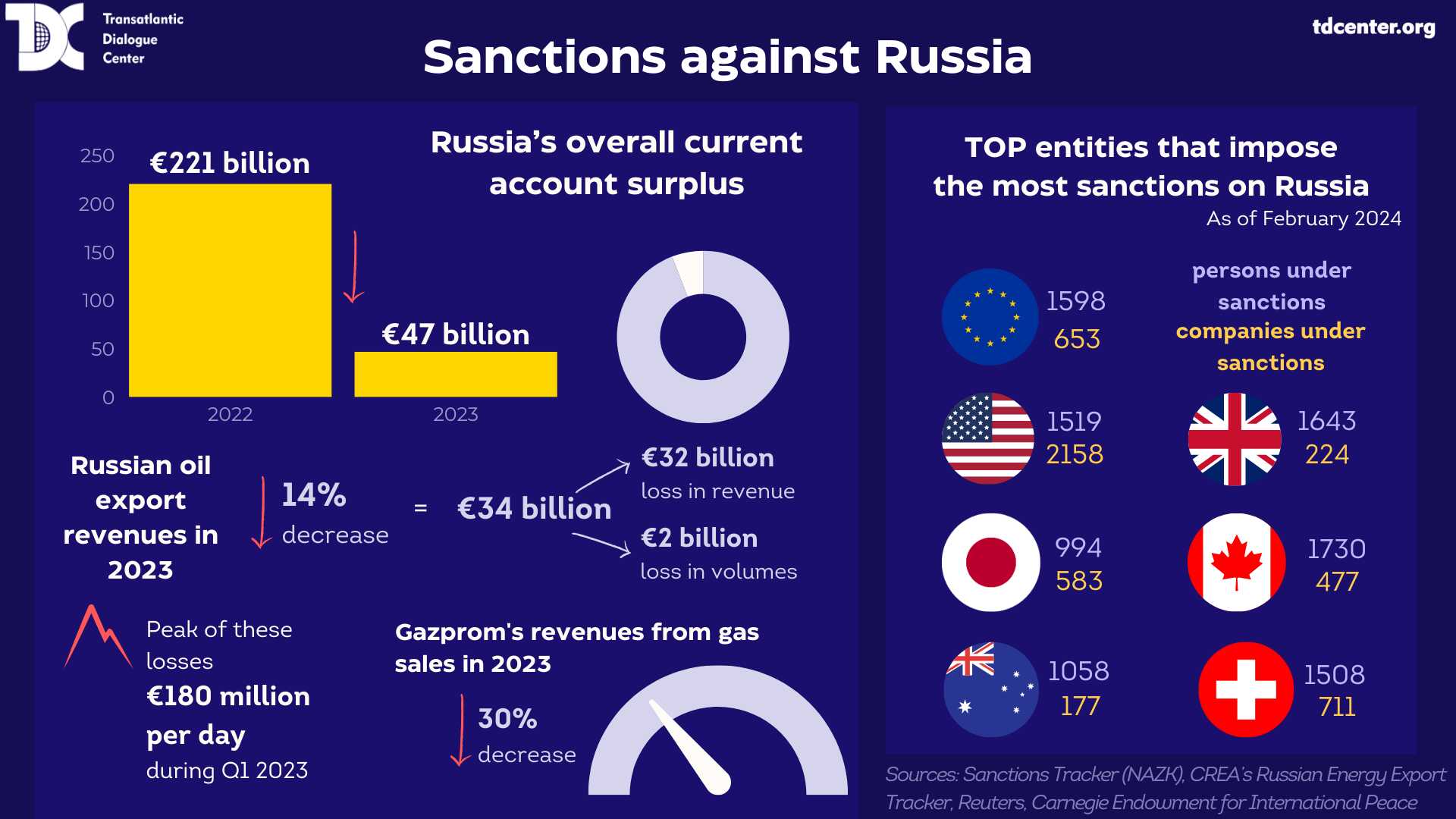89 Sanctions
Russia claims that the sanctions are harming Europe, not Russia. And Russia is campaigning for an end to the sanctions!?
Distort, Distract, Dismay - Russian propagandists discredit sanctions - Russian economy suffers - Russia wants end of sanctions
89.1 Distort, Distract, Dismay
The Kremlin wants to blame others for the troubles it brings on itself. Russia is using the narrative of harmful sanctions to shift responsibility for the food crisis to the European Union. However, it was the Kremlin that attacked Ukrainian ports1 and grain storage facilities, mined fields,23 blocked routes in the Black Sea4, and made it impossible for the grain corridor to work. It was Russian continuous airstrikes, not the actions of the West, that were responsible for restricting food trade worldwide.
Meanwhile, sanctions put pressure on the energy sector, a key contributor to the Russian budget.5 Gazprom, Russia’s energy giant, suffered its worst loss in at least 25 years, with a staggering $6.9 billion deficit in 2023. Gas sales more than halved, dragging revenue down by nearly 30%, as the war severed European ties and choked the company’s main income source.6
The ban on coal imports means a loss of revenues for Russia of €8 billion per year.7
Sanctions and lower energy prices are reducing Russia’s current account surplus, which fell from €4.4 billion in November 2023 to €558 million the following month, its lowest level since 2020. Russia’s overall current account surplus for 2023 totaled €46.7 billion, down from a record €221 billion in 2022 on the back of a surge in global energy prices.8
The West had imposed a series of oil sanctions against Russia, including a ban on crude imports to Europe starting December 5 and a subsequent ban on Russian oil product imports beginning February 5, intended to severely impact Russia’s revenue generation. Initially, in early 2023, these sanctions turned out to be very effective.
In reaction to the sanctions, the export of oil redirected its focus from Europe to Asia. Modifications were made to the tax system to align with these sanctions, diverging from the reliance on the Urals blend as a standard. These adaptations facilitated a turnaround in the budget’s financial performance by the summer of 2023. By the conclusion of the year, Russia announced a 3.6% economic expansion and a budget deficit of 1.9% of GDP, slightly surpassing initial estimates.9 Russia recorded a 308 billion roubles (€3.1 billion) budget deficit in January 2024, significantly less severe than the 1.7 trillion roubles (€17 billion) deficit experienced in January 2023.
Although the Russian government manages to reduce the impact of sanctions on its economy, they are still creating impact and budgetary holes. The sanctions compelled Russia to offer larger discounts on the price of its oil to attract new buyers. As a consequence, there was a decline in Russian oil export revenues, amounting to a 14% decrease (€34 billion) within the first 12 months following the imposition of sanctions. This decrease consisted of a loss of €32 billion in revenue, accompanied by a slight reduction in export volumes, resulting in a €2 billion loss. The peak of these losses occurred at EUR 180 million per day during the first quarter of 2023. Russia experienced a 23% decrease in revenue from seaborne crude, €20.3 billion in total.10

Russia is trying to convince the world that the sanctions are ineffective, illegal, and harmful only to the West. In this way, the Kremlin wants to demonstrate its superiority over Ukraine’s Western partners and get the sanctions lifted. However, even with regard to Russia trying and actually managing to circumvent sanctions they are creating a hole in the budget and causing tremendous problems in the functioning of major Russian enterprises.
YET ANOTHER ATTACK ON UKRAINE’S PORTS IMPACTING A CIVILIAN CREW AND VESSEL WHEN ENTERING THE PORT OF PIVDENNYI, ODESA. (n.d.). Ukraine. https://ukraine.un.org/en/252252-yet-another-attack-ukraines-ports-impacting-civilian-crew-and-vessel-when-entering-port↩︎
Landwirte in Lebensgefahr: Ernten neben Bombenkratern und Minenfeld. [Farmers in mortal danger: Harvesting next to bomb craters and minefields.](2022, August 14). Euronews. https://de.euronews.com/2022/08/14/landwirte-in-lebensgefahr-ernten-neben-bombenkratern-und-minenfeld↩︎
Pabst, V. (2022, October 18). Ukraine: Der Krieg zerstört Felder und blockiert Getreide-Export. [Ukraine: War destroys fields and blocks grain exports] Neue Zürcher Zeitung. https://www.nzz.ch/international/ukraine-der-krieg-zerstoert-felder-und-blockiert-getreide-export-ld.1695644↩︎
Dickinson, P. (2023, March 22). Russia’s Black Sea blockade is part of Putin’s war on international law. Atlantic Council. https://www.atlanticcouncil.org/blogs/ukrainealert/russias-black-sea-blockade-is-part-of-putins-war-on-international-law/↩︎
Energy Fact Sheet: Why does Russian oil and gas matter? (2022, March 21). IEA. Retrieved May 1, 2024, from https://www.iea.org/articles/energy-fact-sheet-why-does-russian-oil-and-gas-matter↩︎
Soldatkin, V. (2024, March 26). Gazprom 2023 net profit to Russian accounting standards down 7% to $7.5 billion. Reuters. Retrieved March 30, 2024, from https://www.reuters.com/markets/commodities/gazprom-2023-net-profit-russian-accounting-standards-down-7-75-bln-2024-03-26/↩︎
Guarascio, F.. (2022, April 8). EU slashes 10% of Russian imports with new sweeping sanctions. Reuters. Retrieved May 1, 2024, from https://www.reuters.com/world/europe/eu-adopts-new-sanctions-against-russia-including-coal-import-ban-2022-04-08/↩︎
Prokopenko, A. (2024, April 10). Is the Kremlin Overconfident About Russia’s Economic Stability? Carnegie Endowment for International Peace. https://carnegieendowment.org/2024/04/10/is-kremlin-overconfident-about-russia-s-economic-stability-pub-92174↩︎
Aris, B. (2024, February 8). Russia reports a painful RUB308bn deficit in January, but nowhere near as bad as the RUB1.7 trillion deficit in January 2023. Intellinews. Retrieved May 1, 2024, from https://www.intellinews.com/russia-reports-a-painful-rub308bn-deficit-in-january-but-nowhere-near-as-bad-as-the-rub1-7-trillion-deficit-in-january-2023-311449/↩︎
Tracking the impacts of G7 & EU’s sanctions on Russian oil; Centre for Research on Energy and Clean Air. (2024, February 5). Centre for Research on Energy and Clean Air. https://energyandcleanair.org/russia-sanction-tracker/↩︎

